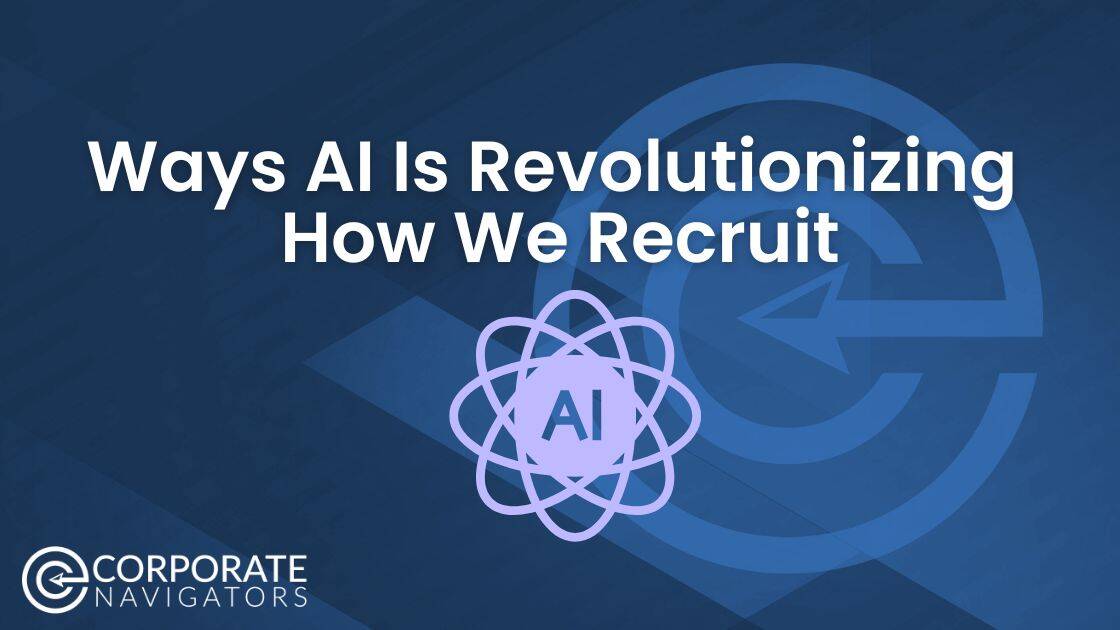
Table of Contents: AI Revolution in Recruiting
The AI Revolution in Recruitment
As technology evolves, professionals across all industries and functions are discovering the benefits of streamlining operations with new tools and tricks. Namely, AI is transforming recruitment by automating and enhancing a wide range of tasks, allowing recruiters to spend more time with human-to-human interactions and streamlining once rote tasks. This fundamentally changes how companies attract, assess, and hire talent.
7 Core Recruiting Tasks Artificial Intelligence Is Revolutionizing
1. Faster Sourcing and Candidate Matching
AI can quickly scan vast databases and online profiles to identify candidates who best fit job requirements, significantly reducing manual search time and improving match quality.
2. Candidate Assessment
Automated tools evaluate resumes, skills, and even soft skills using natural language processing and machine learning, helping recruiters shortlist top candidates more efficiently.
3. Writing and Communication
Writing individualized messages and emails is surely effective at connecting with candidates, but it can be time consuming. Thankfully, generative AI assists in crafting job descriptions, email communications, and personalized outreach, ensuring consistency and saving recruiter time.
4. Engage Candidates with Chatbots and Conversational AI
AI-powered chatbots engage candidates 24/7, answering FAQs immediately. Chatbots can make sure nobody falls through the cracks by guiding candidates through the application process, and even conducting initial screenings, enhancing the candidate experience and freeing up recruiter capacity.
5. Predictive Analytics Assist with Decision-Making
AI can take vast amounts of data and synthesize them to identify patterns and predict future trends. In recruiting, you can use AI to analyze historical hiring data to forecast candidate success, identify potential turnover risks, and optimize sourcing strategies. This proves useful when identifying candidates who are qualified and most likely to stay for the long haul.
6. Interview Scheduling
Scheduling interviews and booking other appointments can take up a lot of time that could be spent on other fruitful tasks, which makes conversational AI such a useful tool for recruiters. Using automated scheduling tools to coordinate interviews can reduce back-and-forth and accelerate the hiring timeline.
7. Other Workflow Automation
Just like with scheduling interviews, AI can streamline repetitive tasks, such as resume screening and interview feedback collection, allowing recruiters to focus on higher-value activities like relationship building and updating candidate pipelines.
Impact and Results
Companies using AI in recruitment report dramatic reductions in manual tasks up to 75% for screening and 95% for scheduling. This frees up recruitment professionals to focus on high-impact tasks instead of spending hours conducting routine, time-consuming jobs.
This results in higher candidate satisfaction rates that contribute to a better candidate experience. It’s a win-win for candidates and recruitment professionals alike, expediting the hiring timeline, lowering time to hire, and maximizing the positive impact on a company’s brand.
What new skills will recruiters need as AI becomes more integrated in hiring?
As AI becomes more deeply integrated into hiring, recruiters will need to develop a blend of technical and human-centric skills to remain effective and add value. Key new skills include AI literacy—the ability to understand, interpret, and work alongside AI-driven tools for tasks like resume screening, candidate matching, and predictive analytics.
must also become adept at analyzing and acting on AI-generated data insights, using these findings to make informed, strategic hiring decisions. Ethical oversight and bias detection are increasingly important, as recruiters will be responsible for ensuring AI systems operate fairly and inclusively, auditing algorithms to prevent unintended discrimination.
With AI handling repetitive tasks, recruiters can focus more on relationship-building, candidate experience, and human-centered interviewing skills like empathy, communication, and the ability to assess cultural fit become even more critical.
Additionally, as recruitment becomes more data-driven, recruiters will need to collaborate closely with hiring managers, communicate complex AI insights clearly, and leverage metrics to demonstrate the value of their hiring strategies. Upskilling in these areas ensures recruiters remain indispensable as strategic partners in a rapidly evolving, AI-powered talent landscape.
How will recruiters develop skills to interpret Artificial intelligence insights effectively?
Recruiters will develop the skills to interpret artificial intelligence insights effectively through a combination of targeted training, practical experience, and strategic adaptation of new technologies.
Many organizations are investing in upskilling programs and professional certificates, such as those offered by LinkedIn Learning, which teach recruiters how to leverage AI for data-driven decision-making, reduce bias, and manage AI responsibly within recruiting processes. These programs often include modules on understanding AI-generated analytics, ethical considerations, and best practices for integrating AI insights into everyday hiring decisions.
In addition to formal training, recruiters are encouraged to shadow AI tools in their workflow, comparing AI-generated recommendations with their own intuition, identifying where each excels, and learning to recognize patterns in candidate data that AI highlights. This hands-on approach helps recruiters become familiar with the strengths and limitations of AI, allowing them to combine human expertise with AI-driven analytics for more nuanced hiring decisions.
Recruiters also need to focus on continuous learning and adaptation, regularly auditing AI-driven decisions for bias, and staying updated on the latest advancements in AI technologies. By integrating AI insights with their own pattern recognition and candidate advocacy skills, recruiters can ensure they interpret and apply AI data effectively, resulting in better matches and more equitable hiring outcomes
The AI Revolution in Recruitment
It’s an AI revolution! Artificial Intelligence is not just automating recruitment, but it is elevating the entire process, making the recruitment process more responsive and organized. From sourcing and assessment to engagement and analytics, AI-driven tools are making hiring faster, fairer, and more candidate-centric. As adoption grows, expect even more innovation in how organizations attract and select top talent.
If you need help sourcing candidates to engage with, then contact Corporate Navigators. We are experts at identifying talent that meets your criteria so you can make the best hiring decisions! We look forward to hearing from you.


